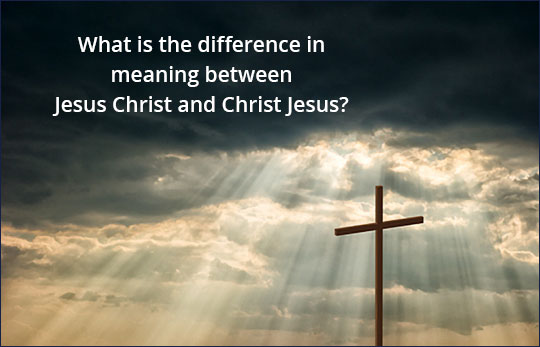Bible Question:
What is the difference in meaning between Jesus Christ and Christ Jesus?
Bible Answer:
Even though the meaning of “Jesus Christ” is identical to “Christ Jesus,” the emphasis is different. That is, “Jesus Christ” and “Christ Jesus” refer to the same person but there is a change in emphasis. The significance of both is explained in the following Q&A. For more information about the meaning of “Jesus” visit “What is the meaning of Jesus in the Bible?” For more information about the meaning of “Christ” visit “What is the meaning of Christ in the Bible?”

“Jesus Christ” In The New Testament
The name “Jesus Christ” (excluding Lord Jesus Christ) occurs 71 times in the New Testament. The first time it appears is in Matthew 1:18.
Now the birth of Jesus Christ was as follows: when His mother Mary had been betrothed to Joseph, before they came together she was found to be with child by the Holy Spirit. Matthew 1:18 (NASB)
It occurs in most books of the New Testament. The exceptions are Luke, 1 Thessalonians, 2 Thessalonians, Philemon and 3 John. The last time it appears is in Revelation 1:5.
“Christ Jesus” In The New Testament
The name “Christ Jesus” occurs 91 times in the New Testament. The first time it appears is in Acts 24:24 and the last is in Philemon 23.
But some days later Felix arrived with Drusilla, his wife who was a Jewess, and sent for Paul and heard him speak about faith in Christ Jesus. Acts 24:24 (NASB)
It occurs in most books of the New Testament, except for 2 Thessalonians, Hebrews, James, 1 Peter, 2 Peter, 1 John, 2 John, 3 John, Jude and Revelation.
Difference Between “Jesus Christ” and “Christ Jesus”
The order to the two names “Jesus” and “Christ” does not reveal anything unique about Him. But the order of the two names does imply a different emphasis. For example, “Jesus Christ” appears in Romans 1:4 and “Christ Jesus” appears in Romans 1:1. Here are the two verses.
. . . concerning His Son, who was born of a descendant of David according to the flesh, who was declared the Son of God with power by the resurrection from the dead, according to the Spirit of holiness, Jesus Christ our Lord . . . Romans 1:3 – 4 (NASB)
Paul, a bond-servant of Christ Jesus, called as an apostle, set apart for the gospel of God . . . Romans 1:1 (NASB)
Notice that in the second verse, Romans 1:1, that Paul reminds us that he is bond-servant (doulos) or slave of Christ Jesus. Since the name of Christ refers to the Messiah or the future ruler of the coming millennial kingdom, Paul is emphasizing the title of Christ as the Messiah. That is, He is emphasizing that he is the slave of his Messiah since he puts the messianic title before the name “Jesus.”
In the first verse listed above, Romans 1:4, Paul emphasizes the humanity of Christ after he had just referred to His birth and resurrection from the dead. Therefore, when “Christ” occurs before “Jesus,” it emphasizes the messianic title of our King. When “Jesus” occurs before “Christ,” the humanity of our Savior is emphasized.
Other Passages The Reveal The Slight Difference In Emphasis
Another passage where the difference in emphasis is obvious is 2 Timothy 2:3 and 2 Timothy 2:8.
Suffer hardship with me, as a good soldier of Christ Jesus. 2 Timothy 2:3 (NASB)
Remember Jesus Christ, risen from the dead, descendant of David, according to my gospel . . . 2 Timothy 2:8 (NASB)
In verse 3, Paul refers to himself as a good soldier and then emphasizes the kingship of Jesus Christ. In verse 8 the emphasis is on his humanity that make its possible for Him to be our Savior from sins.
Conclusion:
In summary, the order of the names Jesus and Christ does not change the identity of the person. But the order puts a particular emphasis on the person. Jesus Christ emphasizes His humanity, and Christ emphasizes that He is the Messiah and coming King. You are encouraged to see other names for God in “What are the names of God?”
Suggested Links:
What is the meaning of Jesus in the Bible?What is the meaning of Christ in the Bible?
What are the names of God?
What does the name El Shaddai mean?
Jesus Is the Great I Am